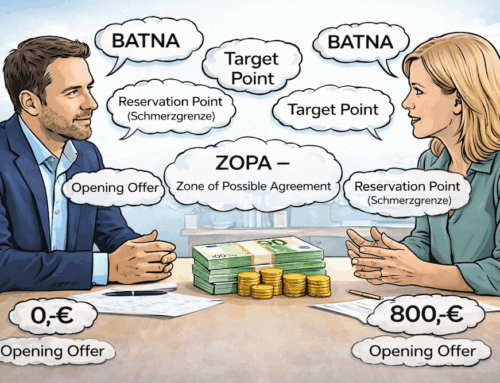Neutrality and impartiality
from third parties in conflict
vs.
Neutrality and impartiality
from mediators
Quotes and aphorisms
In the face of a conflict between other parties to the conflict Neutrality and impartiality are not a value in themselves.
The extent to which neutrality and impartiality represent a value for peace and general security depends largely on the specific circumstances.
Conflicts between two people also change the relationship with those around them. Even in the face of conflicting parties, it is impossible not to communicate: Conflicts provoke and force people to take a stand – and must do so in the name of peace and pacification. Sometimes circumstances allow for neutrality, for example when the conflict has not yet escalated badly and the parties appear and act as equals. However, these „social freedoms of bystanders “ are diminishing – depending on two factors:
- Degree of escalation: The more the conflict escalates, the more the parties or at least one party tries to enforce its approach to a solution even against the will of the other side and in this respect to act in a more one-sided, coercive and ultimately unjust manner.
- Degree of networking and involvement: The more the bystanders are networked with the conflict parties, the more they are involved and provoked by the conflict dynamics and escalation.
The fact that mediators pride themselves on their neutrality and impartiality is – and I want to make this clear here – not an expression of an inner attitude or mediative professionalisation, even if some may think and wish so. It is the functioning law of a largely pacified society that enables the luxury of neutrality in the face of conflict (and later makes it available for the cultural technique of professionalised mediation“). The rest is „Fuck you! “mood…
„Mediative“ neutrality and impartiality are the expression of a contractual agreement with the parties to the conflict! They are an expression of a professional working alliance and contractual, temporary and legally or socially acceptedMediators are allowed to remain neutral and impartial in order to fulfil their special mandate, which they have concluded with the parties to the conflict.
The Mediation Act also clearly states this: Mediators are independent, neutral and committed to each side in mediation. However, a mediator is not a mediator by nature or by training, but by contract, namely a mediator contract, which is concluded with the parties to the conflict, who in turn become mediants.
What does this contractual embedding of mediation mean for the mediating third party? There is no mediator without mediation, no mediator contract without an underlying mediation agreement between the parties to the conflict.
Mediator is not suitable as an identity for identity seekers!
Mediator is a professional role in conflict resolution, but not an individual characteristic of a person, but rather a power that is inherent in everyone, but can only be called upon contractually.
To achieve this contract-orientated understanding of mediation and, in particular, neutrality and impartiality, ten quotations and aphorisms are compiled below.
My top ten
1.
„To be effective, any peacekeeping mission must be impartial, But neutrality does not mean neutrality towards justice and humanity “
(Kofi Annan)
2.
"As a mediator, you always have to be impartial, but that doesn't mean that you are blind to injustice."
(Ban Ki-Moon)
3.
"Neutrality in situations of injustice means being on the side of the oppressor. You have to decide in favour of justice."
(Desmond Tutu, Bishop)
4.
"Neutrality helps the oppressor, never the victim. Silence encourages the tormentor, never the tormented."
(Eli Wiesel)
5.
"Neutrality is possible with equal and equitable conflict parties."
(unknown)
6.
"The world is not threatened by those who are evil, but by those who allow evil."
(Albert Einstein)
7.
"Peace is not just the absence of conflict; It is the ability to handle conflicts through peaceful means."
(Nelson Mandela)
8.
"Silence is not neutral."
(Unknown)
9.
"Sometimes it is necessary to distance yourself from both sides of a conflict, to find a solution that brings lasting peace."
(Albert Schweitzer)
10.
„As a peacemaker, you often have to stand between the parties without leaning towards one side, but always upholding the values of justice and humanity “
(Nelson Mandela)
Missing You a quote that should also be mentioned here on the requirements for the mediator?
Then feel free to write it in the comment function…







Leave A Comment